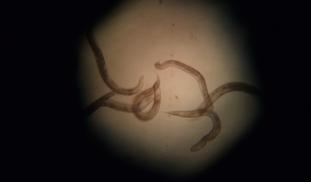Please wait...
About This Project
The hypothesis that is being tested is if C. elegans will build up amyloid beta (AB) plaques after heat stress exposure, possibly leading to Alzheimer's disease (AD). C. elegans (nematodes) demonstrate symptoms of Alzheimer’s disease such as amyloid plaques, genes and their mutations, and memory impairments. Heat-shock is a form of stress that could potentially increase the rate of AD, and during heat shock, transcription and translation proteins in C. elegans will become inhibited.
More Lab Notes From This Project

Browse Other Projects on Experiment
Related Projects
Can we decipher vocalizations of parrots in a complex social network?
Parrots can "talk" like humans. However, whether their complex vocalizations follow syntactic rules and...
Finding a Cure for Batten Disease
In March of this year, both of our daughters, Charlotte and Gwenyth, were diagnosed with Late Infantile...
Growing symbiotic new senses for humans
This project seeks to experiment with haptic sensory substitution ("a way to bypass one traditional sensory...







